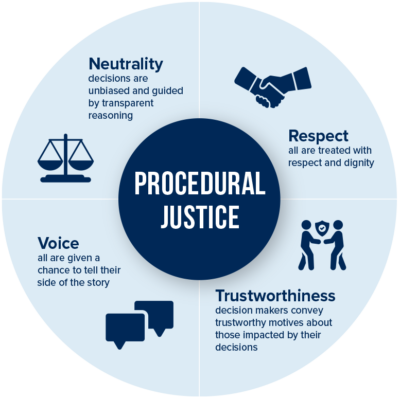
The Association of Prosecuting Attorneys, in partnership with Yale Law School’s Justice Collaboratory and LaGratta Consulting and supported by the Chan Zuckerberg Initiative, are excited to announce the Elevating Trust and Legitimacy for Prosecutors Project.
 Prior system improvements, including evidence-based decision-making and alternatives to jail, have been successful at improving public safety while broadly reducing the harms that individuals may encounter in the criminal justice system. While these reforms have made progress on these outcomes, a crucial step to achieving a just and trusted legal system is to ensure individuals are treated fairly and with dignity and respect as they move through the criminal justice system.
Prior system improvements, including evidence-based decision-making and alternatives to jail, have been successful at improving public safety while broadly reducing the harms that individuals may encounter in the criminal justice system. While these reforms have made progress on these outcomes, a crucial step to achieving a just and trusted legal system is to ensure individuals are treated fairly and with dignity and respect as they move through the criminal justice system.
More than a decade’s work in policing and courts settings has shown how concerted efforts can help change the way criminal justice professionals communicate and engage with system participants and produce increased public trust and voluntary compliance and cooperation.
For the selected pilot agency, participation will require a commitment as follows:
- Engage in a collaborative assessment, planning, and implementation process with project staff for a minimum of 15 months
- Assign chief of staff or office equivalent to coordinate office involvement in the project, along with administrative support for scheduling calls and meetings, supplying needed policies and procedures, and identifying relevant stakeholders
- Help project staff facilitate the collection of feedback from direct users, including past witnesses, defendants, or other community members
- Host up to three in-person or remote site visits for project staff to meet with key office personnel and observe typical practices (especially those where prosecutors and staff are interacting with members of the public)
- Upon selection, the partner office will be asked to supply an electronic bulk data extraction of historical case-level data, for all cases processed by the office (including nolle prosequi, dismissals, etc.) for a period of 12-24 months. To protect privacy, the data can be stripped of Personally Identifiable Information (PII) but will require a unique identifier to allow the tracking of cases over time.
Resources
“Evidence Doesn’t Seem to Play a Key Role”: A Conversation with David Weisburd By Greg Berman
National Police Foundation: Enhancing Procedural Justice in Hot Spots Policing
Select Procedural Justice Resources for Prosecutors
To Be Fair – Jeffrey Kremers Interview
To Be Fair, Kremers interview onlyProcedural Justice In Action – Center for Court Innovation, BJA
Procedural-Justice-in-Action_Resource-Guide_FINALCenter for Court Innovation – What is Procedural Justice?
Click here to access the password-protected Resource Page designated for the Elevating Trust & Legitimacy Pilot Sites and National Prosecutorial Advisory Group on Elevating Trust & Legitimacy.
City Project

APA and the Justice Collaboratory have also selected two additional sites to continue their work on the Elevating Trust and Legitimacy for Prosecutors Project, the Saint Paul City Attorney’s Office and the Columbus City Attorney’s Office. This project will assess how city prosecutors interact with the surrounding community, implementing evidence-based practices to increase public trust.

Project staff will work with prosecutors and staff across the selected offices to identify and enhance existing trust-building opportunities internally and externally. The pilot will also seek to test how new practices can supplement the office’s gun diversion work and other interactions with the accused, witnesses, victims, and other members of the public.
The project will utilize technical guidance from The Association of Prosecuting Attorneys, Yale Law School’s Justice Collaboratory and LaGratta Consulting. Funding support for the project will come from The Joyce Foundation, Walmart, and Arnold Ventures.






